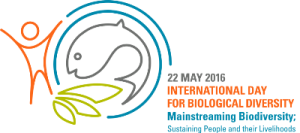In the Crossfire: Women Environmental Defenders
May 20th, 2016 | By admin | Category: Other ResourcesBy Suzanne York.
Some of the greatest and most dedicated guardians of our planet are women. At Women Deliver, an international conference dedicated to improving the lives of women, it is heartening to see the efforts of female environmental defenders being acknowledged. With the International Day for Biological Diversity recognized on May 22 (this year’s theme is Mainstreaming Biodiversity; Sustaining People and their Livelihoods), it is a good time to reflect on what many women face in the struggle to protect their communities.While male environmentalists certainly face life and death consequences for their activism, it is a different story for women. A report by the Urgent Action Fund for Women’s Human Rights puts it succinctly – Yes, there is a difference between women’s and men’s experiences in environmental justice activism, because the activism of men is widely accepted, but if you are a woman they ask, “why you?”
At a Women Deliver panel titled “Women Defending Environmental and Human Rights,” speakers touched upon how many women environmental defenders face harassment, sexual and gender-based violence, and lack of spousal support.
According to the United Nations Office of the High Commissioner on Human Rights, these forms of violence can have adverse social consequences, including stigmatization, in addition to causing physical harm. Related to this, attacks against female defenders often focus on their reputation and/or their sexuality as non-conforming with dominant stereotypes of appropriate female behavior. Also, women defenders often face more risks when participating in collective public action because of perceptions of the traditional role of women in some societies.
The murders of women environmental defenders such as Berta Caceres of Honduras and Juvy Capion of the Philippines were brought up during the Women Deliver panel. Both women were fighting large-scale mines, amongst other community and environmental threats. In the case of Caceres, she had been facing threats to her life and family for years. Caceres, a Goldman Environmental Prize winner, was assassinated in her own home. Capion was also killed at home, along with her two sons.
Judy Pasimio of Purple Action for Indigenous Women’s Rights in the Philippines, spoke of how another female activist was nearly stabbed by her husband, who was upset at his wife’s work fighting to protect the environment and community. The Philippines is one of the world’s most dangerous place for environmental defenders.
Marcela Ballara, a consultant with the International Council for Adult Education in Chile, noted some actions that can make a difference in the lives of women environmental defenders. These actions include:- Training and education – both school and informal education;
- Connectivity – for example, in Mozambique, rural women have cell phones and can communicate if they are harassed or feel unsafe;
- Mobilization/raising global awareness – i.e., international mobilization for Berta Caceres prompted the Honduran government to take action and arrest four suspects in her murder;
- Solidarity – support from the developed world is key.
In another panel on women and economic justice, Tessa Khan, an international human rights lawyer, stressed that the private sector isn’t bound by the human rights frameworks that governments are. It is much harder to hold corporations accountable, and they often evade responsibility, especially in the Global South.
Grassroots women environmental activists face many obstacles and often work on the frontlines in remote locations. As noted above, international solidarity is crucial to their success. In the face of overwhelming threats from all directions, it is a testament to their dedication to protect their communities and environment despite the struggles they face.
To learn more about courageous women environmental defenders fighting for a better world, read the report In Our Bones: Stories from Women Defending Land, Community, Human Rights and the Environment in Indonesia & the Philippines.
Suzanne York is Project Director of Transition Earth.

![[photo credit: https://twitter.com/katha_nina/status/723555510729977856]](http://populationgrowth.org/wp-content/uploads/2016/05/images.jpeg)
![[photo credit: Urgent Action Fund]](http://populationgrowth.org/wp-content/uploads/2016/05/introduction-300x100.jpg)
